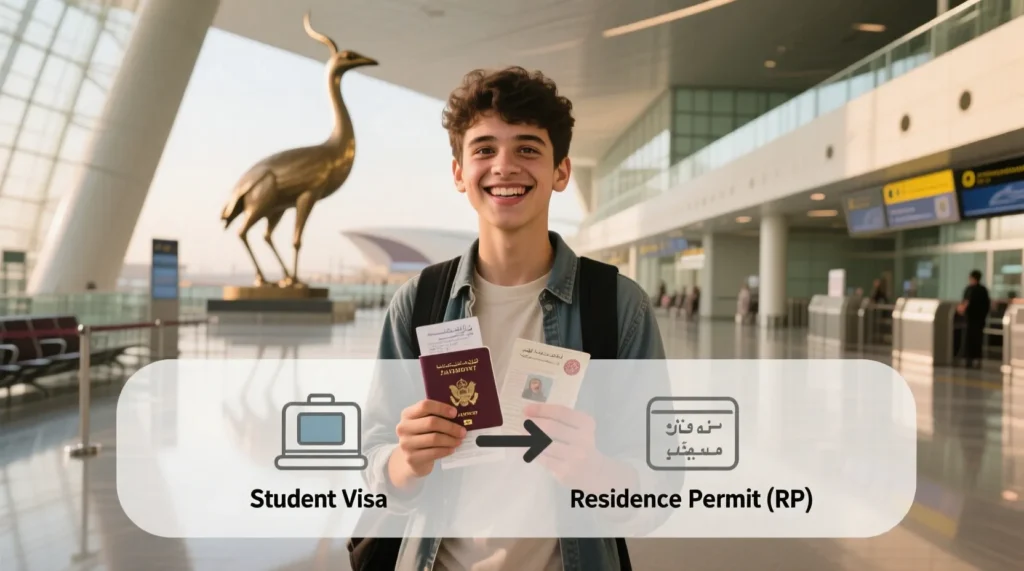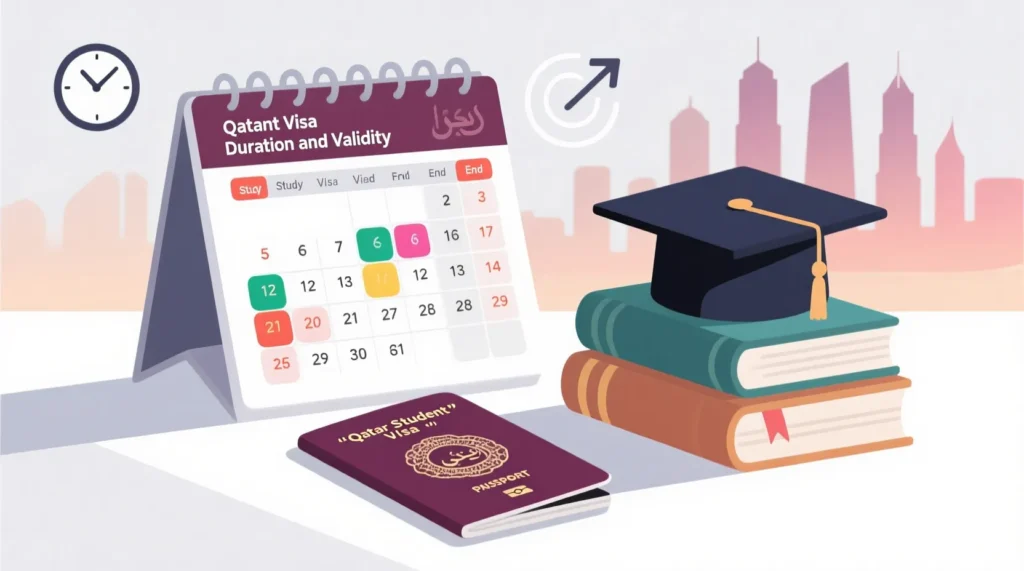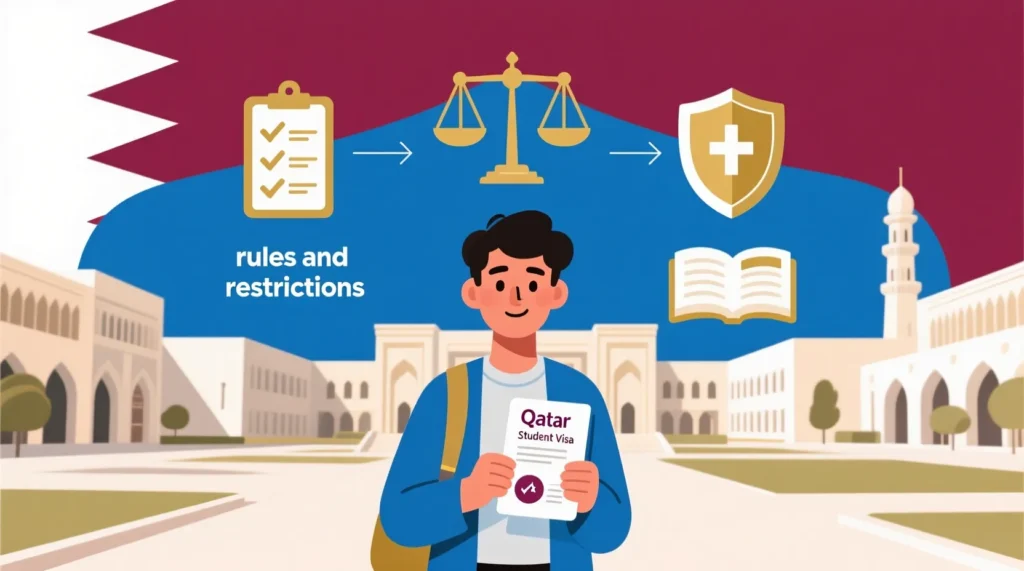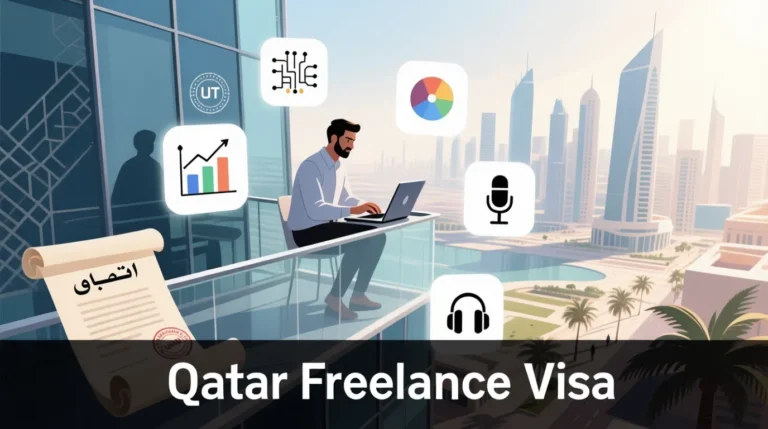Studying in Qatar has become a growing choice for international students who want world-class education in the Middle East. The country hosts respected universities, modern campuses, and scholarship opportunities that attract learners from Asia, Africa, and Europe. To begin this journey, a student visa is the first step. Understanding its requirements, fees, and process helps you plan smoothly, avoid delays, and focus on building your academic future in Qatar.
What is a Qatar Student Visa?
A Qatar Student Visa is a type of residence permit issued to international students who wish to study in Qatar. It allows foreign nationals to live in the country legally while pursuing academic programs at universities, colleges, or educational institutes recognized by the Qatari government.
This visa is usually sponsored by a Qatari university or a legal guardian living in Qatar. The purpose is strictly educational, meaning you cannot work full-time under a student visa, though some universities may allow part-time or on-campus work depending on rules.

A student visa is typically issued for 1 year and can be renewed each academic year until the completion of your studies.
In short, a Qatar Student Visa = Permission to live + study in Qatar legally.
Types of Qatar Student Visas
If you’re planning to study in Qatar, it’s important to understand the types of Qatar student visa available. The visa you need will depend on the length and purpose of your studies. Here are the main categories:

1. Full-Time Student Visa Qatar
This visa is designed for students who enroll in undergraduate, postgraduate, or PhD programs at recognized universities in Qatar. It usually covers the entire duration of the study program and can be renewed annually.
2. Short-Term Student Visa Qatar
If you’re taking a short academic course, training program, or exchange semester, you will need a short-term student visa Qatar. This visa is valid for a few months and is not extendable beyond the course duration.
3. Research Visa Qatar
For scholars and researchers conducting fieldwork or collaborating on projects, Qatar offers a research visa Qatar. This visa is often sponsored by research institutions or universities and is valid for the length of the project.
4. Language Course Visa Qatar
Students enrolling in Arabic or English language programs can apply for a language course visa Qatar. These visas are usually short-term, ranging from a few weeks to several months, depending on the course.
Choosing the right Qatar student visa type ensures a smooth study experience and helps you avoid legal issues during your stay. If you want to visit qatar before getting admission you can visit Qatar on travel visa as well.
Comparison Table of Qatar Student Visa Types
| Visa Type | Duration | Eligibility | Extension Options | Typical Purpose |
|---|---|---|---|---|
| Full-Time Student Visa | 1 year (renewable) | Admission in a recognized Qatari university | Renewable yearly until graduation | Undergraduate & postgraduate degrees |
| Short-Term Student Visa | 1–6 months | Exchange students or workshop participants | Usually non-renewable | Summer schools, short academic programs |
| Research Visa | 6 months – 1 year | Researchers with institutional sponsorship | Extension possible with approval | Research projects, PhD fieldwork |
| Language Course Visa | 3–12 months | Enrollment in a registered language institute | May be extended if course continues | Learning Arabic or English in Qatar |
Eligibility Criteria for Qatar Student Visa
Before applying, it’s important to know whether you meet the Qatar student visa eligibility requirements. Qatar welcomes international students, but you must satisfy specific conditions set by the government and universities.

General Eligibility Requirements
- University Admission – You must have an official acceptance letter from a recognized Qatari university or educational institution. (related to: Qatar university admission requirements)
- Age Limit – Most universities require students to be at least 18 years old to apply. However, there is generally no strict upper Qatar student visa age limit, as postgraduate and research students are often much older.
- Academic Records – You must provide transcripts, certificates, or proof of previous education that meet the admission criteria of the chosen program.
- Financial Proof – Evidence of sufficient funds to cover tuition fees, living expenses, and health insurance in Qatar.
- Medical Clearance – A medical test showing you are free from contagious diseases.
- Clean Criminal Record – A police clearance certificate may be required to ensure you have no history of criminal activity.
- Valid Passport – Your passport must be valid for at least six months beyond your intended stay in Qatar.
Key Notes on Eligibility
- If applying for a full-time student visa, admission to a degree program is mandatory.
- Short-term student visas may have lighter requirements, focusing mainly on proof of enrollment and financial support.
- For research visas, applicants usually need sponsorship or collaboration proof from a Qatari university.
- Language course visas often require basic academic documents but not necessarily higher education qualifications.
Qatar Student Visa Requirements
If you want to study in Qatar, you’ll need to meet certain student visa requirements. The Qatar Ministry of Interior and the university you’re applying to will jointly process your visa, so you must prepare the following documents carefully.

Unconditional University Admission Letter
- You must have an official admission letter from a recognized Qatari university (e.g., Qatar University, Hamad Bin Khalifa University, or Education City institutions).
- The letter should clearly state your program name, duration, and start date.
- Conditional offers (pending IELTS/TOEFL or missing documents) are usually not accepted for visa approval.
Valid Passport
- Your passport should be valid for at least 6 months from the date of visa application.
- Some universities in Qatar may require 12 months validity.
- Make sure your passport has two or more blank pages for visa stamping.
Proof of Financial Support / Bank Statement
- You must prove that you can financially support your education and living expenses in Qatar.
- This can include:
- Recent 6-month bank statement (with sufficient balance)
- Sponsorship letter from parents or guardian (if applicable)
- Scholarship confirmation (if you’re on a Qatar scholarship program)
- Generally, expect to show funds covering tuition + living costs (around QAR 50,000 – 80,000 per year depending on the program).
Health Certificate & Medical Report
- Qatar requires students to undergo a medical check-up.
- Common tests include:
- Chest X-ray (for TB screening)
- Blood tests (HIV, Hepatitis, etc.)
- The medical report must be attested and submitted along with the visa application.
Academic Documents & Translations
- You must submit copies of academic certificates (high school diploma, bachelor’s degree, transcripts).
- Documents should be:
- Notarized by your home country’s education board
- Attested by the Qatari Embassy or Consulate
- Translated into Arabic or English (if in another language)
Passport-sized Photographs
- Typically, 4–6 recent passport-size photographs are required.
- Must follow Qatar visa photo requirements:
- White background
- 35mm x 45mm size
- Neutral expression, no accessories
Completed Visa Application Form
- You must fill out the Qatar student visa application form, available through the university’s international office or the Ministry of Interior’s portal.
- Ensure that details like passport number, admission ID, and personal info match your official documents.
Application & Processing Fees
- Most student visa applications require a non-refundable processing fee.
- Typically around QAR 200–300 (varies by university and visa type).
- Payment is usually made online or through the university’s finance department.
Local Address in Qatar (if required)
- Some universities may require you to provide a local address in Qatar (student dormitory or rented accommodation).
- If you’re staying in university housing, the admission office will include this in your visa support documents.
Top Colleges and Universities in Qatar
Qatar has become a global hub for higher education, attracting students from Asia, Europe, and North America. Through Education City and independent institutions, the country offers world-class programs in medicine, engineering, business, arts, and social sciences. Below are some of the most recognized colleges and universities in Qatar that international students often choose:

Qatar University
The country’s national university, offering programs in science, engineering, law, medicine, and Islamic studies. It is one of the most popular destinations for both Qatari and international students.
Georgetown University in Qatar
Located in Education City, Georgetown focuses on international affairs, politics, and global studies—perfect for students aiming for careers in diplomacy or global organizations.
Northwestern University in Qatar
Specializes in journalism, media, and communication studies, with strong ties to the global Northwestern University network in the United States.
Hamad Bin Khalifa University (HBKU)
A graduate-focused research university offering programs in law, Islamic studies, computer science, and sustainable development. HBKU collaborates with international partners for advanced research.
Texas A&M University at Qatar
Renowned for engineering programs, particularly petroleum and chemical engineering, aligned with Qatar’s energy and technology sectors.
Weill Cornell Medicine – Qatar
A leading medical college that trains students in medicine and healthcare, directly affiliated with Cornell University’s medical school in New York.
Lusail University
One of Qatar’s newer institutions, offering programs in business, law, and international relations with a focus on modern skills and innovation.
University of Doha for Science and Technology
Specializes in applied sciences, engineering, and technical education ideal for students seeking career-focused degrees.
Virginia Commonwealth University School of the Arts in Qatar
Offers degrees in design, fashion, interior architecture, and fine arts, attracting students passionate about creativity and innovation.
Al Rayyan International University College (ARIU)
Provides hospitality and tourism management programs in partnership with European universities.
Carnegie Mellon University in Qatar
Focuses on computer science, business administration, and information systems, highly valued for tech-driven careers.
College of the North Atlantic – Qatar
A leading technical college offering diplomas and degrees in engineering, business, and health sciences.
City University College (Qatar)
Offers flexible undergraduate and postgraduate pathways, often in collaboration with international universities.
HEC Paris Business School – Qatar
Globally recognized for its MBA and executive education programs, especially among professionals in finance and leadership roles.
Other International Institutions in Qatar
- University of Aberdeen (UK-based, offering postgraduate programs)
- University of Calgary (Canadian programs in nursing and health sciences)
- Ulster University (business and computing programs)
- Liverpool John Moores University (STEM and applied sciences)
- University of Studies Guglielmo Marconi (online and blended learning)
- Islamic Online University (distance learning in Islamic studies and related fields)
- American University of Afghanistan (partner programs)
- King Fahd University of Petroleum and Minerals (collaborative projects in energy research)
With such a diverse range of universities, Qatar offers international students a chance to pursue degrees across multiple disciplines while experiencing a multicultural academic environment.
Fully Funded Scholarships 2026 for International Students
Here are some top scholarships (from trusted sources) available in Qatar and the GCC region:

1. Qatar University Scholarships
Qatar University offers fully funded scholarships covering tuition, accommodation, and living allowances for outstanding international students. It aims to attract global talent across undergraduate and graduate programs.
2. Doha Institute for Graduate Studies
The Doha Institute provides merit-based and need-based scholarships for master’s programs. These cover tuition fees, housing, and sometimes travel expenses.
3. Hamad Bin Khalifa University Scholarship
HBKU scholarships are open for undergraduate, master’s, and Ph.D. students. They offer full tuition, accommodation, and a monthly stipend for international students.
4. Qatar University (Government Scholarships)
Apart from university-funded aid, the Qatari government provides financial assistance and sponsorships for high-achieving students, focusing on science and technology.
5. GCC States Scholarships (Embassies)
These scholarships are managed through Qatari embassies in GCC countries. They support cross-border education, offering tuition waivers and housing facilities.
6. Hamad Bin Khalifa University (Graduate Research)
Specialized research-based funding is available for students in law, engineering, Islamic studies, and computer science, supporting innovative projects.
7. Khalifa University Scholarship 2026 (UAE)
Though based in the UAE, Khalifa University offers opportunities for international students in science and engineering with full financial coverage.
8. Leakey Foundation Research Grant
This grant supports international students and researchers focusing on human origins, evolution, and anthropology-related studies.
9. University of Doha for Science and Technology
UDST provides merit-based scholarships for international students pursuing applied sciences and technical education with full or partial funding.
Comparison Table: Qatar Scholarships 2026
| Scholarship | Coverage | Level of Study | Benefits |
|---|---|---|---|
| Qatar University Scholarships | Fully funded / Partial | Undergraduate & Graduate | Tuition waiver, accommodation, monthly stipend, travel expenses |
| Doha Institute for Graduate Studies | Fully funded | Master’s | Tuition fees, housing, health insurance, living allowance |
| Hamad Bin Khalifa University (HBKU) Scholarship | Fully funded | Master’s & PhD | Full tuition, accommodation, travel allowance, research support |
| GCC States Scholarships (via Embassies) | Partial / Fully funded (varies) | Undergraduate & Graduate | Tuition support, living stipend (case-dependent), cultural exchange |
| University of Doha for Science and Technology | Fully funded | Diploma, Bachelor’s & Master’s | Tuition waiver, accommodation, monthly allowance, research funding |
| Khalifa University Scholarship 2026 (UAE) | Fully funded | Undergraduate, Master’s & PhD | Tuition fees, housing, health coverage, airfare, research grants |
| Leakey Foundation Research Grant | Partial funding | Research (Anthropology & Human Origins) | Research funding, fieldwork allowance |
Step-by-Step Application Process for Qatar Student Visa
Applying for a Qatar student visa might sound a little overwhelming, but don’t worry I’ll walk you through it step by step. Think of it as a journey where each step brings you closer to studying in one of the most vibrant countries in the Middle East.

Step 1: Secure Admission in a Recognized University
Your first big move is to get admission into a university in Qatar. Without this, you can’t even start your visa process. Once you get your offer/admission letter, keep it safe it’s your golden ticket. 🎓
Step 2: Prepare and Gather Documents
Paperwork isn’t fun, but it’s necessary. You’ll usually need:
- Valid passport (with at least 6 months validity)
- Passport-size photos
- Admission/offer letter from your university
- Proof of funds or scholarship letter
- Academic transcripts & certificates
- Medical test results (sometimes asked later)
Tip: Create a folder physical or digital so nothing goes missing.
Step 3: Submit Online/Embassy Application
Depending on your nationality and university, you may either:
- Apply directly through your university (they often handle it for you), or
- Submit your application via the Qatar Embassy/Consulate in your country.
Be sure to double-check the official instructions every detail matters.
Step 4: Pay Visa Fees
After submitting your application, you’ll need to pay the visa fee. The amount can vary, so check with your university or embassy for exact details. Keep the payment receipt—it’s proof you’ve done your part.
Step 5: Await Approval & Receive Entry Permit
Now comes the waiting game. Once approved, you’ll receive an entry permit. This document allows you to enter Qatar legally as a student. It’s basically the “welcome ticket” into the country.
Step 6: Travel to Qatar
Pack your bags! Once you have your entry permit and flight booked, you’re all set to land in Qatar. Don’t forget to keep all your documents (passport, entry permit, university letter) in your hand luggage for easy access.
Step 7: Undergo Medical Examination in Qatar
When you arrive, one of your first tasks is a medical check-up (blood test + chest X-ray). This is mandatory for all foreign students to make sure you’re fit to stay in the country.
Step 8: Apply for Residence Permit (RP)
Finally, with your medical test cleared, you (or your university) will apply for a Residence Permit. The RP is super important—it’s your legal ID in Qatar and allows you to stay until you finish your studies.
And that’s it! Once you have your Residence Permit, you’re officially ready to start your student life in Qatar.
Pro Tip: Universities in Qatar often assist international students with these steps, so don’t hesitate to reach out to their student affairs office if you’re stuck.
Residence Permit (RP) Process in Qatar
Once you arrive in Qatar with your student visa, the next step is converting it into a Residence Permit (RP) so you can legally stay, study, and enjoy student life in Qatar.

Required Documents
You’ll need to prepare and submit the following:
- Passport (valid for at least 6 months)
- Entry permit copy (received after visa approval)
- University admission/offer letter
- Passport-size photographs (white background)
- Medical test results (HIV, Hepatitis, TB, etc.)
- Fingerprint registration slip
- Sponsor letter (from university or guardian, if applicable)
Timeline & Validity
- The medical test and fingerprinting usually take 1–2 weeks after your arrival.
- The Residence Permit is typically valid for 1 year.
- It must be renewed annually until you complete your studies.
Renewal Rules
- Renewal is done through your university’s administration or directly at the Ministry of Interior (MOI).
- Submit your valid passport, old RP card, university enrollment confirmation, and updated medical insurance.
- Always renew before expiration to avoid fines.
- In most cases, universities assist international students in handling the renewal process.
Tip for Students: Always keep a digital copy of your RP card on your phone it’s often needed when traveling within the GCC, opening a bank account, or applying for internships.
Qatar Student Visa Fees & Costs
Planning your studies in Qatar is exciting, but it’s important to know the costs involved so you don’t face any surprises later. Let’s break down the main expenses step by step:
1. Application Fee
When you apply for a Qatar student visa, you’ll need to pay a non-refundable application fee.
This fee varies depending on your university and the embassy, but it usually ranges between QAR 200 – 500 (USD 55 – 140).
2. Medical Test Costs
After you arrive in Qatar, a medical examination is mandatory. This includes:
- Blood test
- Chest X-ray
- General health check
Average cost: around QAR 100 – 300 (USD 27 – 82).
3. Residence Permit (RP) Fee
The Residence Permit is your official ID in Qatar as a student.
- Fee for RP issuance: around QAR 500 – 1,000 (USD 140 – 275)
- Validity: 1 year (renewable annually)
4. Other Possible Expenses
Apart from the main fees, you should also keep some budget for extra costs:
- Health Insurance: Some universities require you to have medical coverage. Cost: QAR 800 – 1,200 per year (USD 220 – 330).
- Document Translations & Attestations: If your academic or personal documents are not in Arabic/English, you may need to translate them. Cost: QAR 100 – 200 per document.
- Miscellaneous: Courier fees, printing, and small embassy charges can add up to around QAR 100 – 300.
Pro Tip: Always check with your university’s international office for the latest fee structure, as some universities cover part of the costs or offer discounts.
Qatar Student Visa Processing Time
Average Duration
The average processing time for a Qatar student visa is usually 4 to 6 weeks. This includes the time required for application submission, verification of university admission, medical tests, and issuance of the residence permit (RP). However, in some cases, students may receive their visa faster if all documents are complete and accurate.
Factors that Cause Delays
Several factors can extend the processing time for a Qatar student visa:
- Incomplete Documentation – Missing or incorrect paperwork can delay approval.
- University Delays – If the admission letter or verification from the university takes longer, the visa process slows down.
- Medical & Security Checks – Extended verification of health tests or security background checks may add extra time.
- Peak Season Applications – During peak academic seasons (August–September), processing may take longer due to high application volume.
- Translation & Attestation – If your documents require official translation or attestation, it can add a few more weeks.
Tip: Apply for your student visa at least 2 to 3 months before your course start date to avoid last-minute issues.
Qatar Student Visa Duration and Validity
When applying for a Qatar Student Visa, it’s essential to understand the timeframes linked to the type of study you are pursuing. The duration and validity of the visa are directly tied to the nature of the academic program, and students must comply with renewal rules to continue studying legally in Qatar.

Short-Term Courses
If you are enrolling in a short-term course, language program, or training that lasts less than six months, you may be granted a short-term student visa. This visa is usually valid only for the course duration and does not include extended residence rights. Students on short-term visas typically cannot work in Qatar and must leave the country once their program concludes, unless they transition into a longer-term program with an upgraded visa.
Full-Time Programs
For undergraduate, postgraduate, or doctoral programs at Qatari universities, the student visa is generally issued for one year at a time. The visa validity is tied to your academic enrollment, meaning it remains valid as long as you are actively studying and maintaining your status with the university. After completion of the degree program, the visa expires, requiring students either to leave Qatar or transfer to another type of residence permit (such as a work visa, if they secure employment).
Renewal Conditions
Qatar requires student visas to be renewed annually, in line with the academic calendar. Renewal is not automatic; students must submit updated documentation, including proof of enrollment, medical clearance (if required), and residence permit fees. Late renewal can result in fines or even cancellation of the visa. Universities often assist international students in the renewal process, but the responsibility lies with the student to ensure compliance. Maintaining good academic standing and adhering to Qatar’s immigration rules are essential for continuous visa validity.
Conditions and Restrictions on Qatar Student Visa
While a Qatar Student Visa allows international students to legally study in the country, it also comes with certain conditions and restrictions that applicants must carefully follow. These rules are set by the Qatari government to ensure compliance with immigration laws, protect students’ welfare, and maintain the integrity of the education system.

Work Limitations
One of the major restrictions on a Qatar Student Visa is employment. Unlike some countries where students are permitted to work part-time while studying, Qatar has very strict rules. Students on a student visa are generally not allowed to take up any form of paid employment unless they obtain special approval from the Ministry of Labour or their sponsoring institution. Unauthorized work can result in visa cancellation, fines, or deportation.
Travel Restrictions
Students holding a Qatar Student Visa must also comply with travel-related conditions. If a student wishes to leave Qatar temporarily (for holidays or family visits), they may need an exit permit or prior approval depending on the type of residence permit issued. In some cases, students must notify their sponsoring university before traveling. Failing to follow these rules could create issues upon re-entry into the country.
Health Insurance Requirements
Health coverage is another mandatory condition tied to a Qatar Student Visa. The government requires all international students to have valid health insurance, either through the university’s plan or private providers approved in Qatar. This ensures students can access medical care when needed without financial strain. Lack of proper health insurance may affect visa approval or renewal.
Academic Performance Conditions
Maintaining good academic standing is essential for keeping the visa valid. Students must remain enrolled full-time and meet the minimum academic performance requirements set by their university. Poor attendance, low grades, or dropping out of the program can lead to the cancellation of the student visa since the primary purpose of the permit is education.
Common Challenges & How to Overcome Them
Delayed Processing Times
One of the most common issues students face is the delay in visa approval. Although Qatar generally has an efficient system, factors such as incomplete applications, high seasonal demand, or background checks can extend the processing period. To avoid unnecessary stress, it’s best to apply well in advance ideally 2–3 months before your program starts. Regularly checking your application status through the MOI portal or your university’s international office can also help you stay updated.
Missing Documents
Submitting incomplete or incorrect documents is another major reason for visa rejection or delay. Students often forget translations, attestation, or certified copies required by the Qatari authorities. To overcome this, carefully review the checklist provided by your university or the Qatari embassy before submission. Keeping both digital and hard copies of all documents can ensure quick re-submission if needed.
Language Barriers
Since official communication in Qatar is often in Arabic, many international students may face difficulties understanding forms, regulations, or instructions. Universities usually provide guidance in English, but for official paperwork, you may still need Arabic translations. To overcome this, hiring a certified translator or seeking help from your university’s international student office is highly recommended.
Financial Proof Issues
Qatar requires students to show proof of financial stability to cover tuition fees and living expenses. Sometimes, students face challenges if their bank statements are not in the proper format or not recent enough. To avoid such issues, make sure your financial documents are up to date, properly stamped, and translated into Arabic if necessary. Having a sponsor (family member or organization) can also strengthen your application.
Medical Examination Concerns
The medical test is a mandatory step for all student visa applicants. Failing to meet health requirements, such as clear test results for infectious diseases, can result in rejection. In some cases, even minor errors in medical reports can delay the process. To prevent complications, undergo medical tests from an approved clinic in your home country (if permitted) or in Qatar immediately upon arrival. Always double-check the results and ensure they meet the Ministry of Public Health’s requirements.
Life as an International Student in Qatar

Academic Environment
Qatar has positioned itself as a hub for world-class education by hosting renowned universities and research centers, particularly in Education City, Doha, where campuses of prestigious institutions like Carnegie Mellon, Georgetown, and Northwestern are located. The academic environment emphasizes innovation, critical thinking, and global collaboration. Students benefit from modern facilities, international faculty, and access to extensive research opportunities. However, the education system in Qatar also values discipline and adherence to cultural norms, so international students are expected to balance freedom of thought with respect for local traditions.
Accommodation & Living Costs
Living expenses in Qatar can vary significantly depending on lifestyle choices. University dormitories are often the most affordable and convenient option, especially for first-time international students. Alternatively, private apartments and shared housing are available across Doha, though rental costs may be higher. On average, accommodation may range from QAR 2,000 to 5,000 per month, depending on the area and amenities. Living costs also include food, utilities, and internet, which are reasonably priced compared to Western countries. Students can save money by using university cafeterias, local eateries, and public transport options.
Transportation
Qatar has made major investments in modern transportation systems, making student life easier. The Doha Metro is fast, clean, and affordable, connecting most key educational hubs and residential areas. Public buses are another budget-friendly option, although they may be less convenient during peak hours. Many students prefer ride-hailing apps like Uber and Careem for flexible travel. If planning to stay long-term, some students even consider renting or buying a car, but they must factor in the cost of fuel, insurance, and driving license requirements.
Social & Cultural Experience
Studying in Qatar is not only about academics but also about experiencing a blend of tradition and modernity. The country offers a multicultural environment with students and professionals from across the globe. International students have opportunities to join cultural clubs, participate in community events, and explore Qatari traditions such as falconry, dhow boat rides, and Arabic hospitality. At the same time, modern attractions like shopping malls, restaurants, and sports events provide entertainment. However, students must remain mindful of Qatar’s cultural values, such as dressing modestly and respecting local customs.
Climate & Lifestyle
The climate in Qatar is hot and dry for most of the year, with summer temperatures often exceeding 40°C (104°F). This can be a challenge for students unfamiliar with desert climates. Most academic institutions, accommodations, and public facilities are equipped with air-conditioning, making daily life comfortable indoors. Outdoor activities are more enjoyable in the cooler months (November to March), when the weather is pleasant. The lifestyle in Qatar is generally safe, family-oriented, and supportive, providing international students with a secure environment to focus on studies and personal growth.
Tips for a Successful Qatar Student Visa Application
1. Organizing Documents Properly
One of the most common reasons for delays or rejections in student visa applications is poorly managed paperwork. Before applying, make a document checklist and categorize it into sections such as academic records, identification documents, financial proof, and medical certificates. Ensure every document is:
- Translated into Arabic or English if originally in another language.
- Attested by relevant authorities (such as your Ministry of Education, Foreign Affairs, and the Qatari Embassy).
- Photocopied and digitized for backup.
Pro Tip: Keep a dedicated folder—both physical and digital—to store your documents. This makes it easy to retrieve them when the Ministry of Interior or your university asks for additional copies.
2. Preparing Financial Proof Correctly
Qatar requires students to prove they can afford tuition fees, living expenses, and healthcare during their stay. This means you must provide bank statements (typically covering the last 6 months), scholarship letters, or a financial guarantee from a sponsor.
Key considerations:
- Maintain a stable bank balance sudden large deposits just before applying may look suspicious.
- Ensure that your sponsor’s documents (if someone else is funding your studies) are complete, including ID, employment proof, and an affidavit of support.
- If you have a scholarship, ensure the award letter is stamped and officially issued.
Pro Tip: Start preparing your financial proof at least 3–6 months before applying to show consistency in your financial background.
3. Applying Early to Avoid Delays
Student visa processing in Qatar can take 4 to 8 weeks, sometimes longer if additional verification is needed. Last-minute applications increase the risk of missing enrollment deadlines.
- Begin your visa process immediately after receiving your university acceptance letter.
- Coordinate with the university’s international student office, they often provide guidance on the required timeline.
- Book your medical tests and police clearance certificates early, as these can sometimes take weeks to obtain.
Pro Tip: Always track your application status online through the Qatar Ministry of Interior website and keep checking your email for updates.
4. Consulting University’s International Office
Every university in Qatar has an international students’ office or admissions department that helps foreign students navigate visa requirements. They are familiar with the latest immigration rules and can guide you on specific paperwork required by the Ministry.
- Use them as your first point of contact for any doubts.
- Ask them about approved medical centers, required translations, and attestation procedures.
- They often liaise directly with the Ministry of Interior, which speeds up the process.
Pro Tip: Build a good communication line with the international office, respond to their emails promptly and provide requested documents without delay.
By following these steps keeping documents organized, preparing strong financial proof, applying early, and seeking university guidance you significantly increase your chances of a smooth and successful Qatar Student Visa approval.
FAQs about Qatar Student Visa
How to apply for a Qatar student visa in 202?
To apply for a Qatar student visa in 2026, you must first secure admission to a recognized Qatari university. Once you receive the offer letter, the university typically assists in processing your visa application. The process involves submitting your admission letter, passport, medical clearance, financial proof, and other required documents to the Ministry of Interior or through the university’s visa office. It’s advisable to start the application at least 2–3 months before your course begins.
How much bank balance is required for a Qatar student visa?
There is no fixed amount officially stated by Qatar authorities, but international students are usually expected to show sufficient funds to cover tuition fees, accommodation, and living expenses. On average, maintaining at least QAR 30,000–50,000 (USD 8,200–13,700) in your account is recommended to prove financial stability. The actual requirement may vary depending on the university and course duration.
Can I work on a student visa in Qatar?
Qatar student visa holders face work restrictions. In most cases, full-time work is not permitted. However, some universities allow part-time work or internships with prior approval from both the university and the Ministry of Labour. Students are usually limited to working 10–20 hours per week during semesters. It’s essential to confirm work rules with your university before seeking employment.
Is IELTS required for Qatar student visa?
IELTS is not a visa requirement but may be a university admission requirement. Most Qatari universities, especially those offering English-taught programs, require proof of English proficiency through IELTS, TOEFL, or equivalent exams. However, if you studied in an English-speaking institution, you might get a waiver. Always check the specific language requirements of your chosen university.
Can family members accompany international students?
Yes, international students in Qatar can apply for family residence visas to bring their spouse or children, provided they meet financial requirements and have adequate housing. However, this depends on the duration of the course and the university’s sponsorship policies. Family members will also need health insurance and valid medical clearance.
What is the validity of a student visa for short-term courses?
For short-term courses (less than 6 months), Qatar issues temporary study permits instead of long-term student visas. These are valid only for the course duration and usually cannot be extended unless you enroll in a full-time degree program.
How long does it take to process a Qatar student visa?
The processing time varies depending on the university and the Ministry of Interior’s workload. On average, it takes 4–6 weeks for a student visa to be approved. In some cases, delays may occur if medical tests, financial proofs, or background checks require additional verification. Applying early is highly recommended.
Can I transfer from one university to another in Qatar?
Yes, transferring between universities in Qatar is possible but subject to approval from the Ministry of Interior and both universities. You must provide valid reasons for the transfer, ensure that your visa sponsorship is updated, and continue to meet academic and financial requirements. The process can take time, so students should plan transfers well in advance.
Final Thoughts
Getting a Qatar student visa in 2026 is a straightforward process if you start early, secure admission to a recognized university, and prepare all required documents on time. Always double-check with your university’s visa office for updated guidelines and keep some buffer time for processing delays. Planning your finances, health insurance, and accommodation in advance will make your transition much smoother.
As an immigration consultant, I recently guided a student from Australia who came to me for advice about studying in Qatar. His journey highlighted how important it is to understand both the visa requirements and university policies before applying. With the right guidance, students can avoid unnecessary stress and focus fully on their studies.








One Comment